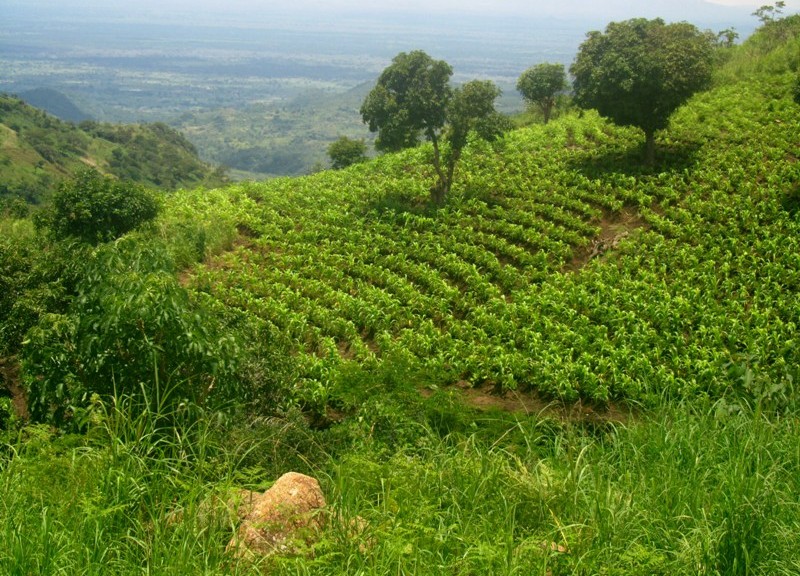I knew I was back in Africa when I encountered the beggars, the honking cars, the sidewalk peddlers offering me handmade mops and used clothing; when I saw the roads choked with pedestrians and barely functioning bicycles. And I knew I was back in Malawi when the people greeted me warmly, asked if I had slept well, went out of their way to help me – – like the stranger who carried my suitcase from a provincial bus depot to the taxi ranks five blocks away. After all Malawi calls itself, “The Warm Heart of Africa”.
On this, my third visit, I am working in the south of the country, staying in Zomba, the original capital of British Nyasaland, modern day Malawi. It is said to be Britain’s most beautiful colonial capital: at the base of the nearly 7,000 feet high Zomba plateau, green hills, mahogany trees.
Hotel Masongola bills itself as Malawi’s most historic hotel, an 1886 colonial mansion. In its day, I suspect it was stunning. However it appears that it was last looked after late that same century. When I checked in: no toilet paper, no soap, no light bulbs, no curtains on my ground floor windows. A visit to the front desk brought these shortcomings under control, but yielded only one light bulb – – and of course a very warm smile.
Malawi faces some challenges. An estimated 42% of population live on less than $1 per day. Secondary school enrollment stands at less than 30% of those of secondary school age. 93% of population remains dependent on wood fuel.
The Mbiza Farmers’ Association (MFA) faces some challenges too. But theirs deal with the marketing of their crops. MFA grows seven vegetables – – tomatoes, onions, mustard greens, and more – – which they sell to middlemen at very low prices. The farmers knew how to grow crops, but they did not know how to market them, expand their business, fetch higher prices. I was asked by my NGO, CNFA, to provide marketing training, teach the farmers to write a marketing plan, and assist in efforts to find more customers. For example we considered calling on the district prison in Zomba, they have many mouths to feed. But the prison roof had blown off the day before I arrived, so management was preoccupied.
From Zomba, reaching the village of Mbiza and its farmers’ association required a very rough 1.5 hour drive over rutted, rocky, and muddy roads. All along the way the barefoot children walking to school in threadbare uniforms waved at the stranger driving through their countryside. I returned these waves so often my rotator cuff became inflamed. Fortunately I could use my other arm to point at the flip chart in my classroom.
I worked with the farmers in a mud brick meeting room with grass roof; the walls stopped two feet short of the roof to allow in some light and a bit of a cooling breeze. There was no electricity nor running water. But there was a dirt floor and benches for the association members to sit on. As usual, my lessons required an interpreter. Emmanuel spoke excellent English and Chichewa, allowing me to communicate with the farmers.
The day we arrived the farmers greeted us with two beautiful songs. The eight women were uninhibited, the sixteen men, more reserved in their singing. However when answering my questions about their farming business, the roles reversed. I did learn that every fortnight they deliver 220 pounds of mustard greens to a secondary school in Zomba via bicycle – – a 4.5 hour bike ride each way. Challenging logistics.
I introduced a market research tool to the association: the Yellow Pages. None of the members were familiar with the phone book. There are no landlines in the village. (I suspect many Americans under 30 who use only Google for research aren’t familiar with yellow pages either.) Incidentally, the Yellow Pages for all Malawi is only ¼ inch thick.
Rural African farmers are not perfectly punctual marketing students. When a man would arrive late, he would bow to me and shake my hand – – while I was in mid lesson. Then he would proceed around the room to shake hands with all of the punctual students. When a woman arrived late she would stand in front of me and courtsy. Quite precious, but pedagogically disruptive.
Ultimately the training paid off. My interpreter and I had secured several sales meeting for the farmers. At these meetings MFA was able to land a hotel, a wholesale buyer, and the district hospital as new customers. Prior to these meeting they had never made a visit to a prospective customer. This just goes to prove Woody Allen’s adage: “80% of success is just showing up.”
At the end of training the thank you speeches were never ending. All got into the act: village headsman, agricultural extension officer, MFA chairman, MFA secretary, a local government official, my NGO handler, my interpreter. And after all the speeches the farmers association gave me three very practical thank you gifts: a sack of beans, a live chicken in a bag, and a live dove in a box. If I can get them through US customs, I’ll have some of you over for dinner. Sorry, not all of you, I have only one chicken and one dove.


This may be the start of another Safeway. Glad you’re home. RSA
Hi Bill, Great report. As usual, you brought me right in there with you. Barry
Thanks for sharing your experience with us. Fascinating to read.
Zach